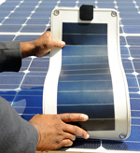
DuPont is collaborating with the U.S. Department of Energy on a $9 million solar research program to enable the broad, commercial production of durable, long lasting, lightweight, high efficiency, flexible photovoltaic modules.
According to DuPont, thin film PV modules are projected to be the fastest growing segment of the solar module industry because of their potential to reduce the cost of producing solar-derived energy, helping solar energy become more competitive with other forms of energy generation. Thin-film PV panels can be made with flexible plastic instead of glass, and can be bent and wrapped, offering greater versatility and easier integration into the roofing, windows, or siding of a commercial or residential building. Environmental degradation can take place without glass protecting the sensitive portions of the module.
DuPont will provide $6 million and the DOE will contribute $3 million to the research program.
“Addressing energy security is a monumental challenge that takes collaborations and partnerships - no one sector or organization can do it alone,” said Linda J. Fisher, DuPont vice president and chief sustainability officer. This program “marks the latest in a string of partnerships DuPont and the U.S. Department of Energy has collaborated in advancing sustainable energy innovations, including biofuels and photovoltaics. This particular technological advancement brings potential to accelerate the use of solar energy by making it more affordable, flexible, and efficient in its application. We are prepared to move from the lab to pilot scale manufacturing.”
Ultimately, the DOE funded program is expected to help enable the broad, commercial production of flexible PV modules that are durable and lightweight with higher efficiency. The initial focus of the program is on copper indium gallium selenide (CIGS) type thin film PV modules; however, the technology could be leveraged into other PV technologies and potentially into other industries.
DuPont has said it expects to nearly triple its annual photovoltaic sales to more than $1 billion in 2012 based on strong fundamentals for long-term revenue growth in the photovoltaic solar energy market, combined with the company’s ability to deliver new technologies to the industry.
For more information, visit www2.dupont.com/Photovoltaics/en_US/.
Publication date:08/10/2009

Report Abusive Comment